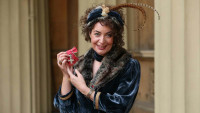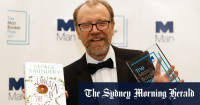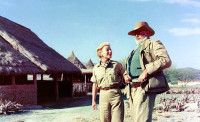
We don’t need more literary magazines
spectatorworld.com – Tuesday February 15, 2022

At CNN, Leah Asmelash laments the demise of many “long-standing” literary magazines. “The Believer,” she writes, which was started in 2003, “was once at the top of the literary magazine game. A leading journal of art and culture, the Believer published the work of icons like Leslie Jamison, Nick Hornby and Anne Carson. It won awards, it launched careers.” But the University of Nevada, which has housed the magazine since 2017, announced that it was shutting it down: “In a statement explaining the decision, the dean of the school’s College of Liberal Arts called print publications like the Believer ‘a financially challenging endeavor.’”
Oh, boy. Leslie Jamison, an icon? The Believer, a publication that “launched careers”? The only thing missing here is some theme music and a “CNN exclusive” or two.
Asmelash goes on to write about a handful of literary magazines housed at universities with MFA programs that are also shutting down — the Alaska Quarterly Review and the Sycamore Review, among others. We get the predictable “It wasn’t always this way” about halfway through:

Valentine’s Day: Four authors share their thoughts on writing romance
belfasttelegraph.co.uk – Sunday February 13, 2022

With romantic fiction sales increasing 49% last year, just what is it about these tantalising tales that set our hearts ablaze?
Mills & Boon author Lynne Graham believes happy endings are one of the reasons why the romance genre remains so popular. Penning love stories helped the Ballymena-based author to achieve her very own happy ending when she used her first book payment for a special purpose.
“My first advance paid for us to go out to Sri Lanka, where we adopted two of our children,” Lynne says.
“I had a 10-year-old daughter at the time. It felt like a miracle that the cheque arrived at that moment and it was sufficient to cover the travel expenses, so I’ve never forgotten it.”
The mum-of-five is the bestselling Mills & Boon Presents author, with sales of 42 million worldwide.

“I do not think it is a good story.” Never ask Charles Dickens for writing advice.
lithub.com – Tuesday February 8, 2022

Today marks the 210th birthday of Charles Dickens—novelist, critic, and, from 1859 until his death, editor of a weekly literary journal called All the Year Round. As literary journal editors will presumably understand, the responsibilities stressed him out to the point of dispensing with politeness. We know this because when Dickens’s friend Captain Frederick Marryat’s daughter Florence submitted a piece and asked him for writing advice, he roasted her to hell for even asking for feedback:

Does the feedback in creative writing workshops make for better writing?
whyy.org – Sunday February 6, 2022

When Yi Wei was a young child, she would write down snippets of English conversations and phrases she heard while watching television. And soon this practice followed her to her early classrooms, where her written responses in her schoolwork would come in fragmented sentences.
“At the time my teachers would be like, ‘Oh, this is a poem.’ And it was because when I was growing up, I kinda learned to speak through the TV.”
Wei is a Chinese immigrant, and she said this is an experience she shares with many immigrants in the United States. She has been writing for years, and now she’s a graduate student in New York University’s poetry MFA program. But Wei didn’t begin writing poems until high school. And she says there was little opportunity for feedback, with the exception of small, informal writing groups she started with close friends.

How to Read a Play as a Manual for Novel Writing
lithub.com – Saturday February 5, 2022

Several years ago, I ran into a neighbor—a fiction writer and essayist—in a coffee shop, where he was reading Harold Pinter’s The Dumbwaiter. “I like to read plays before I write fiction because they remind me how to start writing,” he said.
At the time, I didn’t understand what he meant—I thought the prose I wrote and the plays I wrote were diametrically opposed. I teach playwriting to undergrads, and I tell my students early and often that a play has more in common with a song or a poem than with a novel. In playwriting groups it’s often a veiled insult to be told that your plays are “novelistic”—that’s when you know your play is overwritten and not theatrical. I always thought if I wanted to write a novel—which I did—I had to push what I knew about playwriting away: that other than both being made up of words the two forms were at best distant, and at worst, incompatible.
In March 2020, when I had a big theatrical project postponed indefinitely, I began working on the novel that would become my debut. From the start, I could tell there was something different about my writing, something that excited me—it had an energy, a voice. Once I finished the first chapter, I knew I could keep going. And as I continued to write Vladimir, the story of an English professor’s captivation with a younger colleague, I realized that I was pulling directly from what I knew about playwriting. Here are three aspects I considered:

Identity politics is killing fiction
spiked-online.com – Thursday January 27, 2022

Should authors really feel compelled to write only from their own personal experience as a member of a particular identity group? Or are the current obsessions with authenticity and identity in danger of disfiguring literature completely?
This is not a hypothetical question. For instance, author Sebastian Faulks recently declared that he would stop describing the appearance of female characters. He was responding to criticism from a reader who challenged his ‘right [as a man] to write about a woman’.
This growing wariness over the freedom of a writer to imagine his or her way into a character has coincided with the rise of ‘autofiction’ (short for autobiographical fiction). This genre gathers under its umbrella a flattering range of literary figures, from Sheila Heti and Ben Lerner to Karl Ove Knausgård. It aims to provide a sense of real human experience.

Kate Clanchy: how publishers became the book-burners
spiked-online.com – Wednesday January 26, 2022

In 2021 author, poet and teacher Kate Clanchy gained an unwelcome new accolade: the award for the most liberal target of a cancellation yet. Clanchy’s much-celebrated Some Kids I Taught and What They Taught Me, about her experiences of teaching poetry to disadvantaged children around the UK, won the Orwell Prize in 2020. But a year later, thanks to a handful of the book’s sentences being shared out of context on social media, she found herself publicly shamed by today’s self-appointed moral guardians. She went from being applauded for bringing poetry to working-class children to being humiliated into accepting sensitivity-reader approved rewrites of her work.
It might be a new year but Clanchy’s punishment beating continues. It was announced last week that plans for a woke rewrite of Some Kids I Taught had been dropped – not because it was a God-awful idea to begin with, but because Clanchy and her publisher, Pan Macmillan, have decided to part company ‘by mutual agreement’.
The publisher’s statement notes: ‘Pan Macmillan will not publish new titles nor any updated editions from Kate Clanchy, and will revert the rights and cease distribution of Some Kids I Taught and What They Taught Me and her other works.’ This is an astonishing attempt by a publishing company to distance themselves from an author and her work.

Here are some tips to break writing ‘paralysis’
dailybulletin.com – Sunday January 23, 2022

Psychologists have observed that two years of pandemic really messed up our perceptions of time. As we were yanked in and out of plans and routines with unrelenting news of death and illness, hours and days blurred into a sludge of disappointment, anxiety and grief. Now 2022 begins with a pandemic conclusion still dreadfully elusive, and we may struggle to get started on creative work. But consider a few tried and true ways to break paralysis.
Reflect on immediate motivations: Are you a brand-new writer, testing the imaginative waters? Are you in the middle of a project requiring new attention before the next step, such as submitting for a conference, contest, publication or even an agent? Are you seeking personal invigoration, to break that frozen feeling and regain a sense of flow?

What I picked up when I joined George Saunders’ writing class
smh.com.au – Saturday January 22, 2022

I’ve been having such fun learning about writing with George. I shouldn’t be on such familiar first-name terms with a Booker prizewinner I revere from afar and have never met. But George Saunders is a friendly, avuncular kind of teacher, witty and sharp yet also humble about his own achievements. He calls himself George, and it’s hard to think of him any other way.
His best-known book, the Booker winner, is his extraordinary novel Lincoln in the Bardo, but he’s also won many awards for his surreal and funny short stories. He’s been teaching creative writing at Syracuse University for 20 years, and last year he brought out a book, A Swim in the Pond in the Rain, that encapsulates his thoughts about what makes a good or a great story.

How to write like Ernest Hemingway
bigthink.com – Wednesday January 19, 2022

Today, more than 60 years after his death, Ernest Hemingway is known not just for his moving stories but his technical writing skills. According to E.J. Gleason, professor of Irish and American literature at Saint Anselm College in New Hampshire, Hemingway had found his artistic voice before he turned 26. His signature writing style, characterized by short phrases constructed using plain, everyday English, left a profound impact on the literary world, shaping generations of aspiring fiction and non-fiction writers that followed in his footsteps.
Although Hemingway’s way of writing may seem straightforward, it is by no means simplistic, let alone easy to imitate. A less talented writer might hide their lack of substance behind difficult words and convoluted sentences, but to write like Hemingway requires both a great effort and real intellect. Like a surgeon, Hemingway stripped his stories of any and all insignificant or superfluous information, until only a basic skeleton and a handful of vital organs were left on the page.
Get the free newsletter | Submit a news item or article | Get Writers' News for your website





